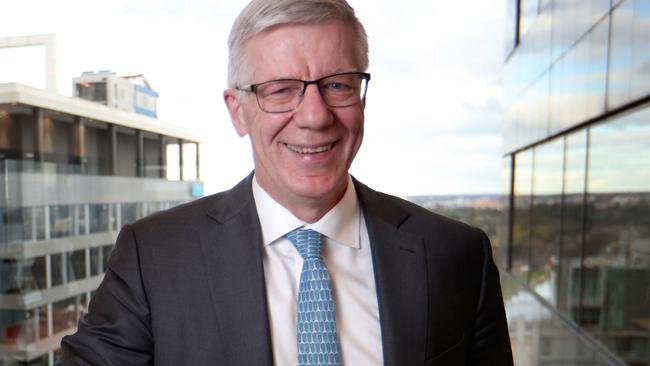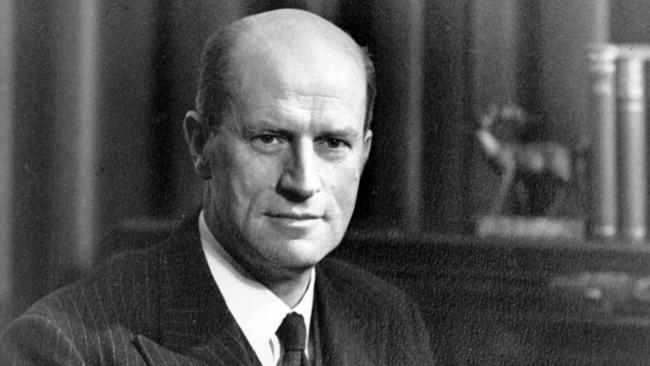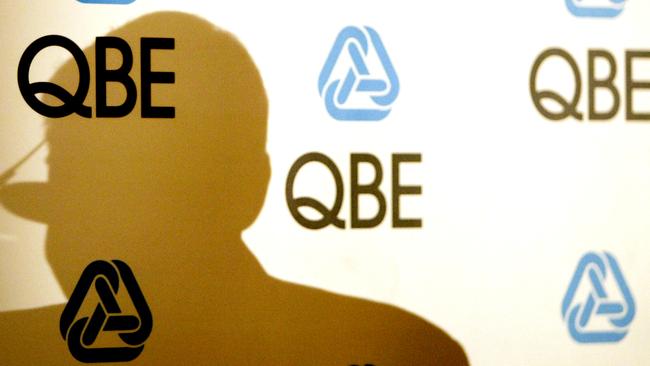AFIC chief Ross Barker reflects on playing the long game in investing
STEPPING aside after 17 years, Ross Barker shares his lessons from life at the top of Australia’s biggest listed investment company, Australian Foundation Investment Company.

Business
Don't miss out on the headlines from Business. Followed categories will be added to My News.
RESILIENCE, it is said, is forged in the fire of adversity.
That might explain why the Australian Foundation Investment Company is in good health as it approaches its 90th birthday this year.
Ross Barker, a director at the Melbourne-based group — Australia’s oldest and biggest listed investment company — notes it was established at an inauspicious time, on the eve of the 1929 Wall Street crash.
“It started in 1928, which wasn’t a particularly good year to start given what happened later the next year and kept on going down into the depression in the 1930s,” says Mr Barker, who has just stepped down as chief executive after almost 17 years.
The company was founded by a senior partner at stockbroking house JB Were, Gallipoli veteran Staniforth Ricketson, as an investment vehicle for clients.
Ricketson was known for his perseverance. His comrades at Gallipoli reported how “a Turkish bullet ploughed a furrow — right across [Ricketson’s] scalp — just missing the bone — but he disregarded it, smiled and carried on”.
Brave but not foolhardy, Ricketson had opted against loading AFIC up with debt.
Perhaps that decision was fortuitous. Perhaps it was wise. Either way, it meant that he could, as Mr Barker puts it, “just ride the market”.

It served the investment company well, and since then, it has rarely had high levels of debt — an attribute that has helped fortify the group during other market shake-outs.
Outwardly, AFIC keeps a relatively low profile. It is also lean, with just 19 staff.
Yet it is major player in the Australian marketplace: when the investment company — now led by its former chief investment officer, Mark Freeman — comes knocking, boards and executives listen.
By way of example, it is the ninth biggest shareholder at the nation’s biggest financial services company, the Commonwealth Bank, with its market value of $140 billion and staff of 45,000.
On Monday, AFIC investors can decide for themselves how it is travelling when the group releases its results for the six months to December.
Given the market rally in recent months, the numbers are likely to be strong. But whatever they show, Mr Barker’s legacy will surely be an impressive one.
Since he was appointed chief executive in February, 2001, the investment company’s portfolio of equities has grown in value from $2.7 billion to more than $7 billion.
Over the same period, the number for shareholders in the company has doubled from 60,000 to 120,000.
AT the core of the share market, says Mr Barker, is a paradox.
“You’ve got a seller who is usually advised by some expert saying why it’s a really good reason to sell,” he says.
“And at exactly the same time, you’ve got a buyer who is being advised by a similarly qualified expert as to why it is a good reason to buy.”
The lesson?
“Nobody gets it right the whole time, so you have to accept that.”
AFIC prides itself on scrutinising both sides of the story, grilling company executives if necessary to evaluate the merits of an investment and to avoid getting swept up in periods of “market euphoria” such as the dotcom bubble at the turn of the century.
Its key holdings include stalwarts such as the CBA, Westpac, BHP Billiton and Wesfarmers.
Inevitably, not every investment delivers to perfection.
Mr Barker points to QBE Insurance as a stock where the investment company should have identified concerns earlier than it did.
The insurer overreached in its US expansion last decade, he says.
“QBE was in our portfolio for a very long time. For year after year they would do very well,” Mr Barker says.
“They had small acquisitions. Frank (O’Halloran, the chief executive) was a great manager, but then they started to go off into the US — they were very large acquisitions.
“And everyone was caught up with the history and failed to see what was happening … the company was over stretching itself.”
There was an important lesson: the need to better examine the dynamic between boards and executives.
“I think one of the interesting things is, when you’ve got a CEO who has been there for a very long time and knows the industry backwards and frontwards, they often have more knowledge of the industry than the board,” Mr Barker says.
“(Now we) think about, ‘what is the knowledge base of the board vis-a-vis the management?’
“You want to have a sense the board has enough capacity to seriously challenge the views of management if they disagree or have a different view.”

Mr Barker says he worries about the increasing workload for boards and the ability of non-executive directors to consider the broader picture.
“There is so much emphasis on regulation and ‘are we doing the right thing with this and that and everything else’, he says.
“You wonder if there is enough time for the board to sit back and say, ‘yeah, but what about the strategy’.”
He can also nominate stocks where — like all judicious investors — AFIC was slower to move than it ideally might have been.
Among them is CSL, the former taxpayer-owned Commonwealth Serum Laboratories that was floated in the 1990s.
Then valued at less than $25 million, the Melbourne-based biotechnology group now has a market capitalisation of $64 billion.
“We had a very small holding in CSL for years,” Mr Barker says, adding that there was a hesitation to invest heavily in the group.
“The mindset was, ‘it is a medical product — it is blood plasma. If there are any problems with the blood plasma, you can imagine the class actions that are going to flow out of out of that’.
“We were behind the eight ball in fully understanding how competent they were in managing their business.”
It gradually dawned on the AFIC investment team that it was an “unbelievably innovative” company, Mr Barker says. After that, “we started buying it”.
“We have bought quite a lot in recent years,” he says, though adds that CSL stock is still “very highly priced”.
REFLECTING on his time at AFIC’s helm, Mr Barker says that when he and his team chatted to company directors and executives, some red flags were easy to spot.
He was particularly wary about companies that frequently switched strategies.
“You say ’what about the other strategy’, and they say ‘well, we think this is where there is better opportunity’,” he says.
“That immediately says to us ‘be careful’.”
Far preferable, he says, is a consistency of message about how a business is to be run over a long period of time.
AFIC’s investment team is also mindful of not “falling in love” with a stock, Mr Barker says.
“We are thinking about where this company will be in five to 10 years — not, ‘how has it done in the last five years’,” he says. “Our style is always long-term.”
AFIC now questions all companies it evaluates about their thinking on “disruption” — be they banks with digital challengers, retailers in the Amazon era or biotechnology titans wrestling with new ways to develop and distribute drugs.
“We want them to be thinking about it,” Mr Barker says.
That said, he tries to avoid the trendy jargon around disruption.
At an elementary level, he says, big and established companies are simply being challenged by operators who are serving customers better.
“Why does it work? Because the disrupters are giving the customers of these businesses something the current people aren’t giving them … a lower price, a quicker service, a better response,” he says.

Still, the disruption phenomenon has brought with it a new paradigm: one where foreign companies such as Uber and Netflix are up-ending once highly profitable domestic industries, from taxis to free-to-air TV.
That creates a dilemma for AFIC, which is domestically focused.
Does it stick to its knitting and invest only in Australian companies at a time when globalisation is changing the rules? Or does it diversify into global equities?
Mr Barker says he mulled a push into offshore stocks, but now “that decision will be for the new guys”.
There are inherent concerns, he says.
“We like to interact with the companies and like to have a sense of who is on the board and who is running the companies and be able to meet them.
“When you start investing overseas it is way more difficult to have that interaction.
“And also, our experience has been (that) people who live in the countries where these companies are based usually have more information than people in other countries.”
Whatever the decision, prudence will surely be at the heart of it. Ninety years of history says as much.
MELBOURNE BEDROCK OF SUPER FIELD
THE growth of the superannuation sector has cemented Melbourne’s position as a pillar of the Australian financial services industry, according to Australian Foundation Investment Company director Ross Barker.
The former director at stockbroking house JBWere says the city plays an increasingly pivotal role in the industry.
“There was a time between perhaps 1980 to the mid 1990s where the sense was Sydney was overtaking Melbourne,” he said.
“A lot of the financial institutions were going up there as (foreign banks) were setting up in Sydney. And Melbourne was perhaps lagging behind.”
Mr Barker, who is also chairman of Melbourne Business School, says that began to change with the superannuation revolution, ushered in with the introduction of compulsory super in the 1990s. With many funds based in Melbourne, it created a critical mass in the city, he says.
As well as two major banks in ANZ and National Australia Bank, Australia’s biggest superannuation fund, AustralianSuper, is based in Melbourne, as are a long list of other super funds and wealth management companies. So too is the nation’s sovereign wealth fund, the Future Fund, meaning the city plays host to Australia’s two biggest pension funds.
Between the Future Fund and AustralianSuper alone, more than $250 billion worth of assets are managed out of Melbourne.


